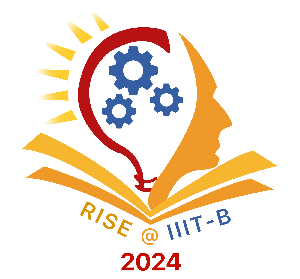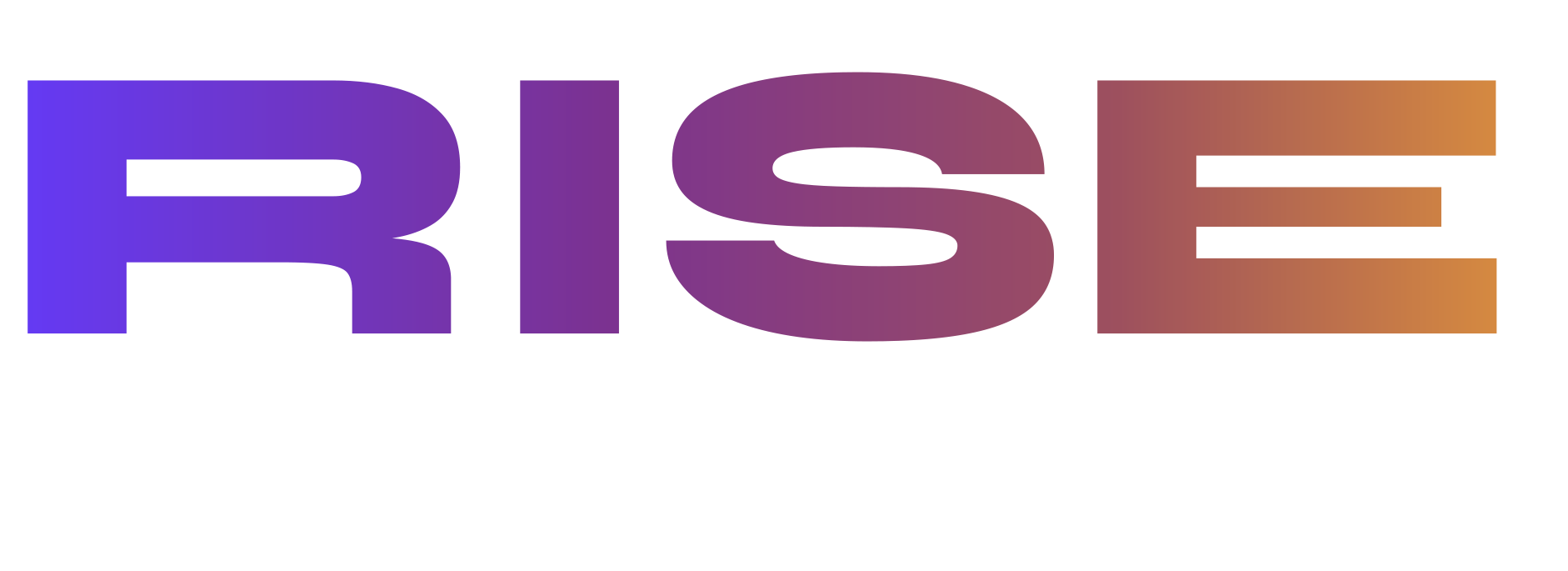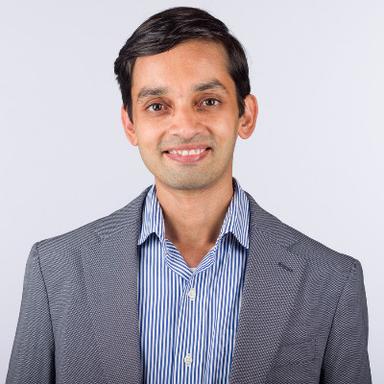Congratulations to the selected candidates for summer internship. Learn More>>
Conclave
Open House




Supported by

Research, Innovation, Society, and Entrepreneurship (RISE) is a flagship Research based Outreach event which is in its seventh edition will be organized on March 23, 2024. This year’s RISE is special which is set to give all its visitors a bird’s eye view on the evolution of research and innovation of IIIT Bangalore.
RISE will be hosted by the International Institute of Information Technology Bangalore (IIIT-B), which is dedicated to showcasing the evolution of research and innovation in the institution. The event is supported by the F1 Foundation, the CSR arm of Mphasis.
On March 23, we have an Open House and as a part of this, there will be a Keynote from the Dr. Amith Singhee, Director, IBM Research India; CTO, IBM India / South Asia on the topic of “Disruptions and Convergence in Computing with Quantum, AI and Hybrid Cloud”.
IIIT-B offers 10 sponsored internships for students who actively participate in the event
Programme
Your Title Goes Here
Your content goes here. Edit or remove this text inline or in the module Content settings. You can also style every aspect of this content in the module Design settings and even apply custom CSS to this text in the module Advanced settings.
9:30 AM : Registration
10.00 AM : Address by Prof. Debabrata Das, Director, IIIT-B
10.10 AM : Overview of Research at IIIT-B by Prof. Srinath Srinivasa, Dean R&D, IIIT-B
10.30AM : Keynote talk by Dr. Amith Singhee, Director, IBM Research India; CTO, IBM India / South Asia
11:30 AM : Poster Presentations, Demos and Lab visits
1:30 PM : Lunch
2:30 PM : Deepdive (Parallel Tutorials Sessions)
4:30 PM : High Tea
Deepdive Session Details:
2:30 PM
Data Science
Generative AI for vision
Prof. Viswanath G
Computer Science
Parameterised Algorithms
Prof. Pradeesha Ashok
Fault-Tolerant Distributed Consensus
Prof. Ashish Choudhury
VLSI
FPGA specific architecture optimizations for accelerators
Prof. Nanditha Rao & Team
IT & Society
Accessibility in the Gobal South
Prof. Amit Prakash
Maths & Physics
Computing with numbers is not just Arithmetic!
Prof. G.S. Raghavan
Physics of Complex Systems
Prof. B. Ashok
NCSP
A Promising Technology for 6G Wireless Networks: Intelligent Reflecting Surfaces
Prof. Amrita Mishra
Joint communication and sensing for V2X Systems
Prof. Prem Singh
Abstracts for tutorial sessions
Generative AI for vision
Prof. Viswanath G
Recent advancements in generative methods for Images/Videos are quite noteworthy due to their high-fidelity content creation capabilities. Accurately modelling the underlying probability distribution of any data of interest, holds the key for generating new data points. In this talk, we will take a closer look on the methods that do explicit modelling of underlying probability distribution of the training data using approximate methods. We will start our discussion with Variational Auto Encoders (VAE), the underlying loss functions and challenges involved with VAEs. We will further discuss how the methods designed for VAEs are adapted to create ‘De-Noising Diffusion Models’, which is now widely adopted for image/video content creation. The talk will conclude with discussing some latest trends in the topic like language conditioned content creation and score distillation sampling .
Parameterised Algorithms
Prof. Pradeesha Ashok
This talk introduces the concept of Parameterised Algorithms and discusses various techniques to design efficient parameterised algorithms for problems that are otherwise considered intractable. We further consider the use of such techniques in several applied areas.
Fault-Tolerant Distributed Consensus
Prof. Ashish Choudhury
Fault-tolerant distributed consensus (also known as the Byzantine generals or Byzantine agreement problem) allows a set of mutually distrusting parties who are distributed in a network, to reach a consensus on a common value, even if a subset of the parties malfunctions and behave arbitrarily during the protocol execution. The problem was introduced by Pease, Shostak and Lamport in their seminal work published in JACM 1980. The consensus problem has received renewed interest recently from various communities, thanks to the advent of blockchain technology, since a blockchain protocol is just an instantiation of a distributed consensus protocol. In this talk, we will discuss some of the classical consensus protocols and some of the fundamental impossibility results in this domain. We will also see how some of the ideas from the classical consensus protocols are deployed in modern blockchain protocols.
FPGA specific architecture optimizations for accelerators
Prof. Nanditha Rao & Team
FPGAs are best suited to accelerate inference due to their inherent parallel processing capabilities. We introduce a vector systolic accelerator with reconfigurable lane-width processing elements (PEs) combined with a novel convolution algorithm. The vector processing unit involves multiple compute blocks and operates on multiple data elements simultaneously to achieve higher throughput. We use reconfigurable lane width vector units to choose the most appropriate PE based on the requirements of the computation. To further improve the throughput on the FPGA, we propose a hybrid tiled vector systolic design in which we partition the design to utilize all the hardware resources. We achieve a competitive peak throughput of 1165 GOPs and propose guidelines on the most suitable lane width for such designs. We propose to assign and dynamically map workloads onto these special-purpose accelerators.
Significance:
Vector processing units are specialized hardware components designed to efficiently perform vector operations. These operations involve applying a single operation to multiple data elements simultaneously, which is particularly useful in machine learning (ML) tasks.
Accessibility in the Global South
Prof. Amit Prakash
Accessibility for persons with disabilities is increasingly being considered an important element of global and national development goals as well as of progressive organizations and firms. Most of the scholarly literature and mainstream discourse in the area of accessibility, however, have a Global North focus, often representing the views of higher income regions and social groups. In this session, the participants will be introduced to a Global South perspective on accessibility, drawing primarily from development theory and disability studies literature. By acknowledging the importance of lived experiences and highlighting the significance of a greater role for persons with disabilities in designing policies and technologies, the session aims to sensitize the participants on the need to incorporate the values of equity, justice and dignity in their everyday work practices, to usher in more inclusive societies.
Computing with numbers is not just Arithmetic!
Prof. G.S. Raghavan
Computing with numbers, more precisely integers, have been playing a major role in computing the communications in general, well beyond just the basic arithmetic (+, -, *, /) on integers. Well even basic multiplication (division) has profound algorithmic implications with the problem of carrying out multiplication of large integers in the most efficient manner continuing to be a thriving area of research. A wide range of applications — cryptography (almost entirely depends on efficient implementations of number theoretic primitives), coding theory (most of the algorithms have their origins in number theory and abstract algebra), signal processing, linear algebra etc.
— many of which are ubiquitous across all modern computing infrastructure. Computational Number Theory is therefore an area that is of tremendous practical and theoretical importance and draws heavily on areas of mathematics and computing such as number theory, abstract algebra, randomized algorithm design and probabilistic proofs, computational complexity theory and algorithm design. This tutorial talk will present a few representative applications and algorithms from computational number theory to motivate the subject and give a quick overview of the range of techniques and algorithms used.
Physics of Complex Systems
Prof. B. Ashok
In this talk, we will briefly discuss the behaviour of complex systems prevalent all around us & in nature. We will look at some typical properties of such dynamical systems, and see how we can understand and predict their dynamical evolution by constructing conceptual models that yield physical insights into the factors influencing these non-trivial systems. Our discussion will cover a diverse panorama of systems, spanning diverse length scales, from nanometres to kilometres. Topics we shall touch upon will include (time permitting) the dynamics of charged bubble oscillators under acoustic forcing, vesicular nanotubulation, physics of sensory systems, the spatio-temporal evolution of ocean carbon sinks & climate change, etc.
Importance of the talk:
Most realistic & natural systems are complex in nature: the behaviour manifested by the system as a whole is more than a simple sum of the parts of the system. Discerning cause & effect in such phenomena is therefore often a challenge. The talk will hopefully help in showing how conceptual
models of complex systems, made by keeping sound physical principles in mind, can yield a wealth of information that also enables us to predict their dynamical evolution.
A Promising Technology for 6G Wireless Networks: Intelligent Reflecting Surfaces
Prof. Amrita Mishra
While the deployment of 5G New Radio (NR) is still underway, academia and industry research is shifting focus towards development of the future 6G technologies which promise immersive services with peak data rates of 1 Tbps, ultra-high reliability of 99.99999%, a position accuracy of 50cm or less, device density of 10 million/km2, 20 years of sensing battery life. These stringent key performance indices (KPIs) impose challenges on future wireless networks to develop disruptive technologies for wireless network enhancement. Recently, intelligent reflecting surface (IRS) has emerged as a promising technology in wireless communication to help extend signal coverage, enhance received signal strength, remove interference and improve the overall communication performance. This talk shall discuss various aspects of IRS-aided improvements in futuristic communication systems.
Joint communication and sensing for V2X Systems
Prof. Prem Singh
Joint communication and sensing (JCAS) technology is envisioned to be an integral part of 6G, as future wireless communication systems are expected to operate on higher frequency bands and a large portion of those bands is assigned to radar systems. JCAS allows the integration of wireless communication and radar technologies by exploiting the similarity between the sensing and communication channel characteristics to enhance spectrum efficiency and reduce hardware costs. One of the key applications envisioned for the JCAS framework is in Vehicle-to-everything (V2X) technology. This tutorial investigates JCAS system based on cell-free massive multiple input multiple output (MIMO) aided multi-static sensing in existing communication systems. To support high mobility scenario, orthogonal time frequency and space (OTFS) waveform is used for the both communication and sensing.

Keynote Talk :
Disruptions and Convergence in Computing with Quantum, AI and Hybrid Cloud
Dr. Amith Singhee, Director
IBM Research India; CTO, IBM India / South Asia
Amith Singhee is Director of IBM Research India and Chief Technology Officer of IBM India/South Asia. As Director, Amith sets the strategy for the Research division in IBM India for driving forward-looking innovation that fuels growth for IBM’s products and services. This includes foundational research in the areas of Hybrid Cloud, AI, Quantum Computing, Cybersecurity, and Sustainability. As CTO, he engages with the regional ecosystem in academia and industry to represent IBM’s technology vision.

-
Limited Accommodation is available for outstation candidates.
-
IIIT-B offers 10 sponsored internships for students who actively* participate in the event
*Determined by IIIT-B Faculty
Scan QR to Register


March 22, 2024

March 23, 2024
All Rights Reserved © 2024 IIIT-Bangalore